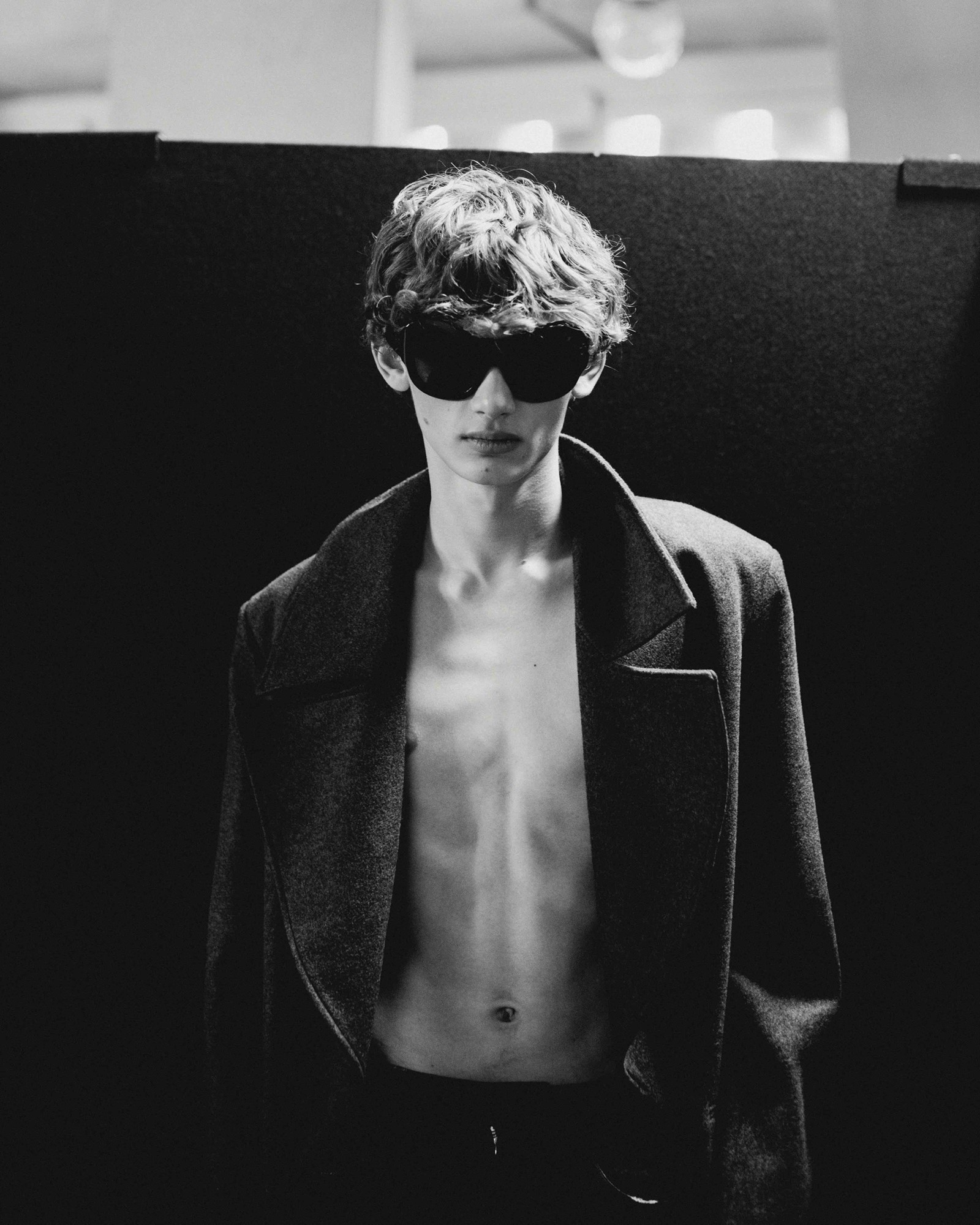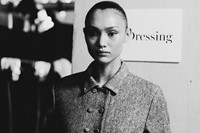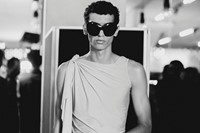After funnelling out of the crammed elevators of the Tate Modern’s Blavatnik tower, there was a sense of calm on the gallery’s sixth floor, watching as the dusk set over St Paul’s Cathedral ahead of Aaron Esh’s first runway show. There’s no doubt the London-born and raised designer has been a name to know on the fashion scene since graduating from Central Saint Martins’ MA Fashion course last year – he’s fresh off the back of his turn as a finalist for the LVMH Prize for graduates, and his soft and contemporary approach to men’s clothing has already, quite miraculously, found him stockists in some of the world’s coolest e-commerce stores. As a new guard in sartorial refinement for a generation of young outsiders, it’s a quiet prestige that rather suits him.
We speak a little over a week before the runway show in a small studio in Dalston; inside, there are just two seats, two rails of clothing, and fitting images taped to the room’s makeshift walls. Esh is exhausted. Despite being part of the British Fashion Council’s Newgen initiative, he elected not to show at the Newgen show space, which occupies a convenient, if slightly unadorned location around Bond Street. “At the time, not showing at the Newgen space felt romantic. And now it’s expensive,” he says, stressing the decision didn’t come from a place of pride. “The reason that this [brand] has done well since graduation was that we were really able to control what our visuals are, and this is all about the visuals. It’s not about me coming out at the end for people to clap, it’s not even about the clothes. It’s about the visuals.”
Another first for Esh: this season, he showed dresses cut for women’s bodies. To a thudding soundtrack composed by the once Alexander McQueen collaborator John Gosling, Esh’s show opened with a slinky red wine dress intuitively draped and twisted at the body’s contours, followed by a contemporary, sexed-up take on a men’s black suit, with a flesh-baring keyhole at the chest and trailing draped lapels. The collection comes armed for a generation less concerned with binaries – it’s more about looking louche, nonchalant and, crucially, hot. “I know the menswear can feel quite non-traditionally masculine, but as [the menswear and womenswear] walk together it feels like – you know – they’re dating.” His menswear has always erred on the side feminine, so much so that women have adopted his clothing as their uniform – but being branded as a designer reshaping the rigid archetypes of menswear is a label he’s not entirely comfortable with. “Works about expressions of gender are really important, but they’re not my story to tell. I think this is going to change now that we’re doing both [menswear and womenswear],” he says. “I was at a point when I was a student, and that was a point of view that felt really authentic. It spoke to the man I was, the men I had in my life, what I saw as menswear.”
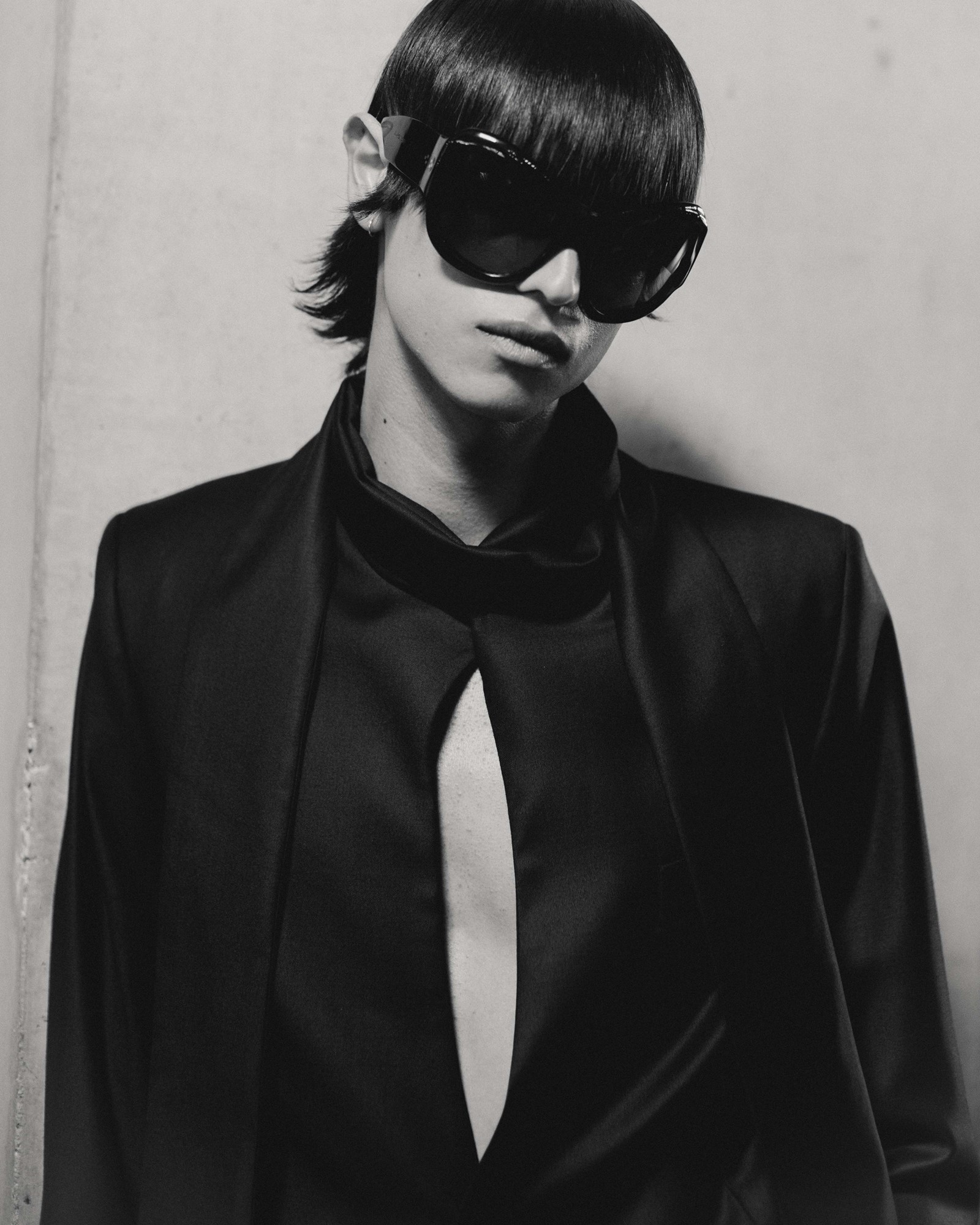
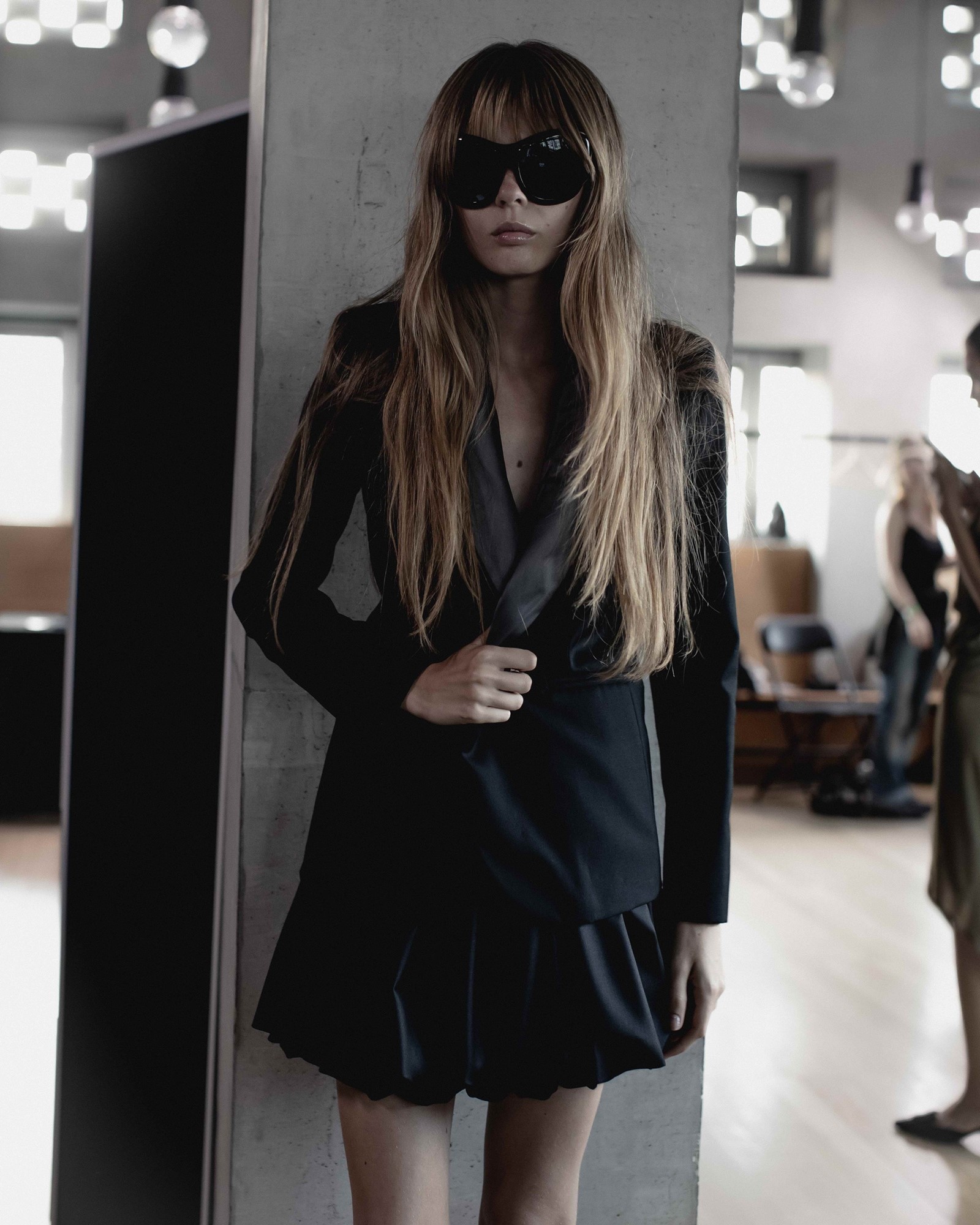
Esh first attended Central Saint Martins to study graphic design in around 2010. “I couldn’t sit at a computer. I dropped out in my first year and then did a bunch of stupid stuff – bummed about, worked for my parents.” Spurred by his love for designers like Raf Simons, Nicolas Ghesquière and Martin Margiela, each of whom taught him that fashion is as much about identity and feeling seen as it is about thread and textile, Esh enrolled in a fashion design course at London College of Fashion, without knowing how to thread a bobbin.
“On the rail, it is a minimalist, perfect collection, but on the runway it’s on some boy who’s probably had a big night and is walking home” – Aaron Esh
But it’s not some stroke of luck he is now emerging through the smoke – this is a path that Esh takes very seriously. Sure, following his knockout MA graduate collection, opportunities have arisen from his cult status; he faced paparazzi at the reception for the LVMH Prize and had conversations with some of the designers he’s spent years idolising, and he’s enjoyed the parties and press profiles – yet finding solace in the stillness of making is integral to Esh’s process. No music plays in the studio when he and his team are focusing on crafting each godet on his intricate dresses, when they forge the couture-inspired fabric-sheathed buttons, nor when stitching the cotton striped Savile Row lining into the sleeves of a jacket. There’s a laser-focused concentration for those details only the wearer might see.
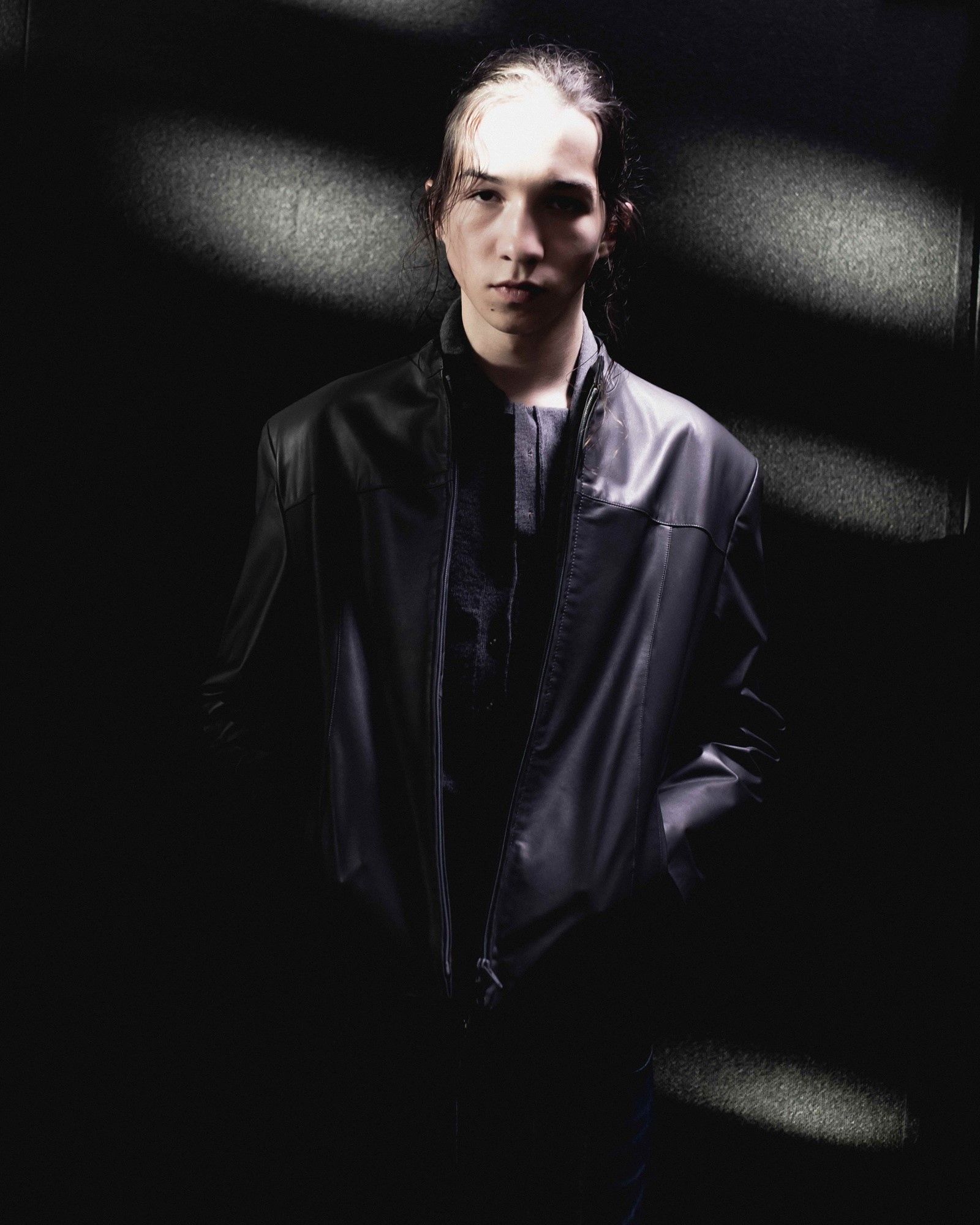
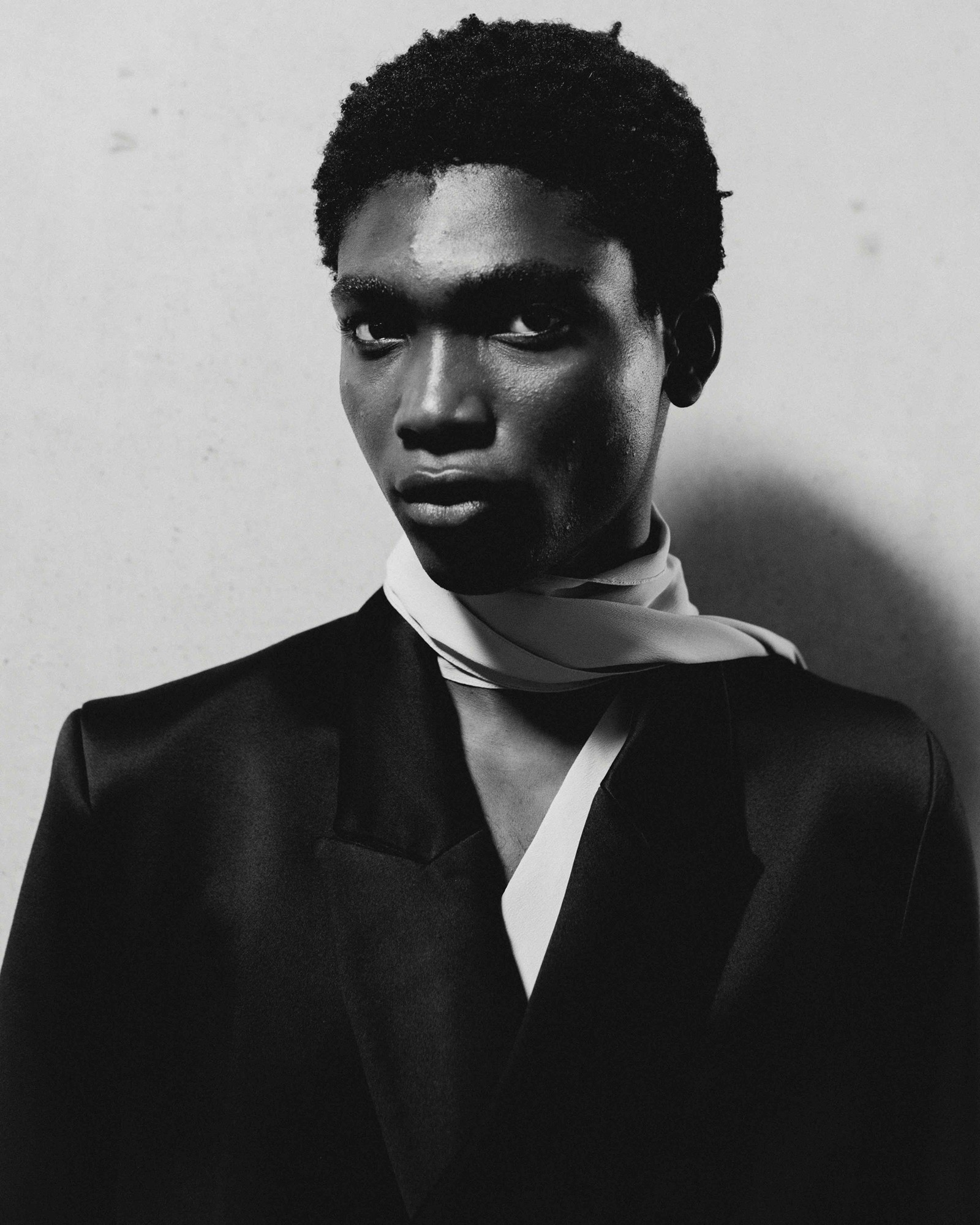
It’s this ebb and flow between chaos and solitude that inspired the S/S24 collection. “I was at an afterparty and someone put on the Salem music video [Starfall] where they’re storm-chasing. I was like, ‘This is what this collection is about.’ The idea of these guys on a journey, chasing the storm.” Esh sees this storm in London’s hedonism, its urban bustle – and being raised in east London, it‘s a whirlwind he’s more than familiar with. “The two things that we’re really trying to show is that I‘m from London, but to me, fashion is Paris.” These French fashion formalities emerge in the details, reaching a quiet crescendo in a superbly cut grey leather jacket, which he grabs to point to each stitch. “There’s nothing on this other than being perfectly sewn – other than the fabric being incredible. It has to be perfect. I love stuff that is not perfect, but that doesn’t sit within this rail of clothes.” The hushed rigour of couture is present in process, yet thrown onto London’s spirited young generation, its wearable sense of ease is prime.
“On the rail, it is a minimalist, perfect collection, but on the runway it’s on some boy who’s probably had a big night and is walking home,” says Esh. Bug-eyed sunglasses make for the first line of defence with a heady hangover. Denims come pre-distressed, dragged on asphalt from latter-day walks of shame. Long ties draping from the neck of shirting and knitwear offer a thrown-on sense of repose, as well as “an element of drama, and cuntiness, for lack of a better word”. With Esh’s first fashion show, he declares his commitment to putting the effort into crafting his clothes, so his wearers don’t have to put the effort into wearing them – and isn’t that sort of the dream? “Definitely, I’m a perfectionist, but for a world that’s not aiming to be perfect.”
